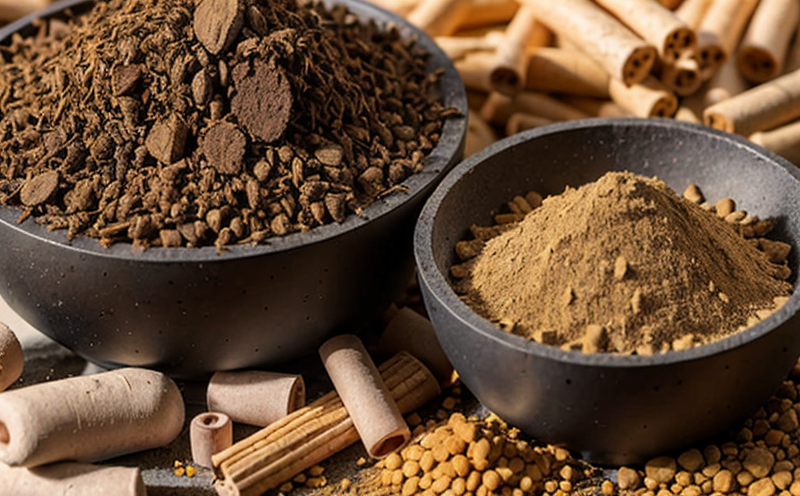EN 15297 Determination of Mechanical Durability of Pellets
The determination of mechanical durability using EN 15297 is a critical process in the biomass and bioenergy resource sector. This method ensures that pellets, which are widely used as fuel for heating systems or power generation plants, meet stringent quality standards. The standard specifies a procedure to assess how well these pellets withstand physical stresses during handling, transportation, and combustion.
The mechanical durability test is particularly important because it helps identify the strength and integrity of biomass pellets under various environmental conditions. Pellets that fail this test may not perform optimally in industrial boilers or domestic heating appliances, leading to inefficiencies and potential hazards such as incomplete combustion or dust emissions.
EN 15297 outlines a series of steps for testing the mechanical durability of pellets. The process involves preparing samples according to specific protocols that ensure consistency across multiple tests. After preparation, the pellets are subjected to repetitive loading cycles using specialized equipment designed to mimic real-world handling conditions. This includes simulating the effects of storage in bins or conveyors and transportation through pipelines.
The acceptance criteria for mechanical durability testing under EN 15297 are based on predefined limits for particle size distribution, weight loss, and structural integrity after the loading cycles. Compliance with these criteria ensures that pellets maintain their quality throughout their lifecycle from production to end use. For instance, if a pellet's particle size decreases significantly or its mass reduces beyond acceptable thresholds, it may indicate poor mechanical durability, which can affect both performance and safety.
Understanding the intricacies of EN 15297 is essential for quality managers, compliance officers, R&D engineers, and procurement specialists working in the biomass and bioenergy sector. These professionals must ensure that their suppliers adhere to international standards like EN 15297 when producing pellets. By doing so, they can guarantee consistent product quality, reduce operational risks, and enhance customer satisfaction.
Furthermore, familiarity with this standard allows manufacturers to optimize production processes by identifying areas where improvements could lead to better mechanical durability outcomes. For example, adjusting the binding agent formulation or modifying pellet manufacturing parameters might yield stronger pellets that perform more reliably under stress conditions.
Benefits
The benefits of conducting EN 15297 mechanical durability tests extend beyond mere compliance with international standards. By implementing this testing procedure, laboratories and manufacturing facilities can achieve several advantages:
- Enhanced Product Quality: Ensures that pellets meet the specified quality parameters set by EN 15297, leading to superior performance in various applications.
- Increased Operational Efficiency: Reduces downtime associated with equipment malfunctions caused by poorly performing pellets.
- Improved Safety Standards: Minimizes risks related to incomplete combustion and dust emissions that could otherwise arise from weak pellets.
- Better Customer Satisfaction: Delivers reliable products that meet customer expectations, thereby fostering long-term business relationships.
Eurolab Advantages
At Eurolab, we pride ourselves on providing comprehensive services tailored to the unique needs of our clients operating in the biomass and bioenergy sector. Our expertise in EN 15297 mechanical durability testing sets us apart as a trusted partner for quality assurance:
- State-of-the-Art Equipment: Utilizing advanced instrumentation that guarantees precise measurement of mechanical properties.
- Certified Technicians: Our team comprises highly qualified professionals trained specifically in performing EN 15297 tests according to ISO and ASTM guidelines.
- Comprehensive Reporting: Deliver detailed reports that not only document test results but also provide actionable insights for process improvements.
- Industry Knowledge: Leveraging deep understanding of the biomass and bioenergy sector, we offer valuable advice on how best to utilize EN 15297 outcomes within broader business strategies.
Use Cases and Application Examples
EN 15297 mechanical durability testing is applicable across numerous scenarios in the biomass and bioenergy sector:
- Biofuel Production Facilities: Ensuring that pellets used as feedstock for biofuel plants meet strict quality standards.
- Distribution Channels: Verifying the durability of pellets during transportation to ensure they arrive intact at end-user locations.
- End-User Applications: Evaluating pellet performance in residential and commercial heating systems to optimize energy efficiency.
- Research & Development: Investigating how different raw materials or production methods impact the mechanical durability of pellets.





